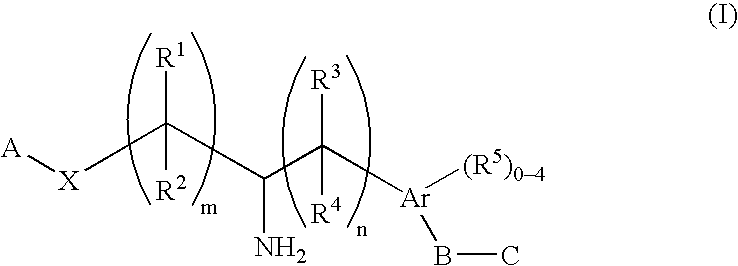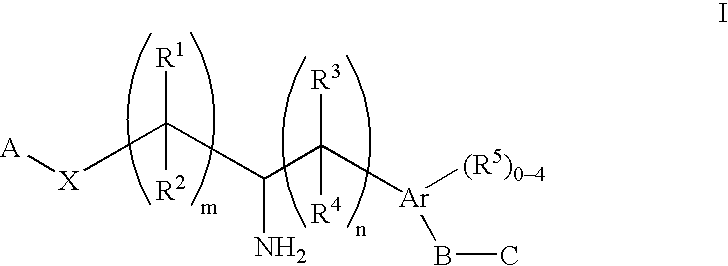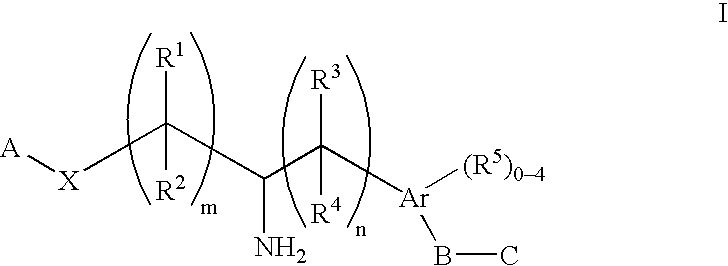Aminoalkylphosphonates and related compounds as edg receptor agonists
a technology of edg receptor and aminoalkylphosphonates, which is applied in the direction of phosphorus organic compounds, antibacterial agents, organic active ingredients, etc., can solve the problems of gastrointestinal discomfort, nephrotoxicity, neurotoxicity, etc., and achieves the effect of reducing the number of side effects, and improving the effect of edg receptor
- Summary
- Abstract
- Description
- Claims
- Application Information
AI Technical Summary
Problems solved by technology
Method used
Image
Examples
example 1
(±)-2-Amino-4-(4-(octylphenyl))butanol, O-phosphate
Step A: (±)-2-Amino-4-(4-octylphenyl)butanoic acid
[0138] A mixture of 13.25 g (30.6 mmol) of diethyl 2-acetamido-2-(2-(4-octylphenyl)ethyl)propandioate (prepared according to the procedure described by Durand, et.al., Synthesis, 2000, 505-506, which is hereby incorporated by reference in its entirety) and 75 mL of concentrated HCL were stirred at 100° C. for 16 h. The mixture was cooled and 75 g of ice was added. The mixture was neutralized (pH=7) with 5 N NaOH. The precipitate was filtered, rinsed with water and dried to afford 8.9 g of the title compound: HPLC B: 2.68 min; ESI-MS 292 (M+H).
Step B: (±)-2-Benzyloxycarbonylamido-4-(4-octylphenyl)butanoic acid
[0139] A solution of 510 mg (1.75 mmol) of (±)-2-amino4-(4-octylphenyl)butanoic acid (from EXAMPLE 1, Step A) in 10 mL of 1:1 v / v dioxane / 1 N NaOH was treated with 0.25 mL (1.75 mmol) of benzyl chloroformate and the resulting mixture was stirred at rt for 2 h. The mixture was...
example 2
(±)-trans-3-Amino-4-(4-octylphenyl)but-1-enyl phosphonic acid
Step A: (±)-2-(t-butoxycarbonylamido)-4-(4-octylphenyl)butanoic acid
[0143] A solution of 9.8 g (30.6 mmol) of (±)-2-amino-4-(4-octylphenyl)butanoic acid (from EXAMPLE 1, Step A) in 150 mL of 1:1 v / v dioxane / 1 N NaOH was treated with 10 g (45.8 mmol) of di-t-butyl dicarbonate and stirred at rt for 1 h. The mixture was partitioned between 550 mL of 10:1 v / v EtOAc / iPrOH and 200 mL of 1 N HCl. The organic layer was separated, dried and concentrated. Flash chromatography on a Biotage 75S cartridge using 4:1 v / v heptane / EtOAc (2.5 L), then 4:1 v / v heptane / EtOAc+1% HOAc (5 L) as the eluant afforded 12.0 g (100%) of the title compound: HPLC B: 4.82 min; ESI-MS 292 (M-BOC+H).
Step B: (±)-2-(t-Butoxycarbonylamido)-4-(4-octylphenyl)butanol
[0144] The title compound was prepared from (±)-2-(t-butoxycarbonylamido)-4-(4-octylphenyl)butanoic acid (from EXAMPLE 2, Step A) using a procedure analogous to that described in EXAMPLE 1, Step ...
example 3
(±)-3-Amino-4-(4-octylphenyl)butyl phosphonic acid
Step A: Diethyl (±)-3-(-butoxycarbonylamino)-4-(4-octylphenyl)butyl phosphonate
[0149] A mixture of 100 mg (0.2 mmol) of diethyl (±)-trans-3-(t-butoxycarbonylamido-4-(4-octylphenyl)but-1-enyl phosphonate (from EXAMPLE 2, Step D) and 40 mg of 10% palladium on carbon in 5 mL of EtOH was stirred under an atmosphere of H2 for 20 h. The catalyst was filtered and the filtrate concentrated to afford 100 mg (100%) of the title compound.
Step B: (±)-3-Amino-4-(4-octylphenyl)butyl phosphonic acid
[0150] A solution of 100 mg (0.2 mmol) of diethyl (±)-3-(-butoxycarbonylamino)-4-(4-octylphenyl)butyl phosphonate (from EXAMPLE 3, Step A) in 3 mL of CH2Cl2 was treated with 0.11 mL (0.77 mmol) of iodotrimethylsilane and stirred at rt for 1 h. The reaction was quenched with 5 mL of MeOH, then concentrated. BPLC purification (HPLC C) afforded 39 mg (56%) of the title compound: HPLC A: 3.94 min; HPLC B: 2.88 min; ESI-MS 356 (M+H).
PUM
| Property | Measurement | Unit |
|---|---|---|
| temperature | aaaaa | aaaaa |
| temperature | aaaaa | aaaaa |
| temperature | aaaaa | aaaaa |
Abstract
Description
Claims
Application Information
 Login to View More
Login to View More - R&D
- Intellectual Property
- Life Sciences
- Materials
- Tech Scout
- Unparalleled Data Quality
- Higher Quality Content
- 60% Fewer Hallucinations
Browse by: Latest US Patents, China's latest patents, Technical Efficacy Thesaurus, Application Domain, Technology Topic, Popular Technical Reports.
© 2025 PatSnap. All rights reserved.Legal|Privacy policy|Modern Slavery Act Transparency Statement|Sitemap|About US| Contact US: help@patsnap.com



